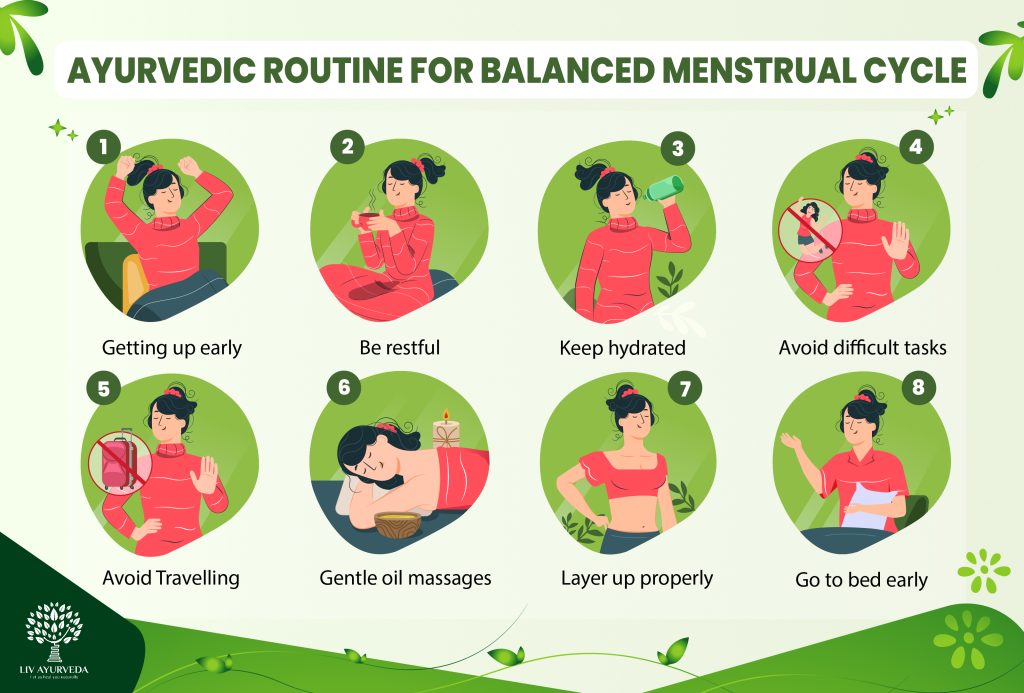
Discover the Ayurveda Routine for a Balanced Menstrual Cycle : RAJASWALA CHARYA
Discover the Ayurveda Routine for a Balanced Menstrual Cycle : RAJASWALA CHARYA

What is Rajaswala Charya
Rajaswala Charya, also known by various names like Rajaswala Paricharya or Rajaswala Vidhi, is a code of conduct for women suggested in Ayurveda during a woman’s menstrual cycle. It empowers women to maintain a profound bond with their bodies, restore equilibrium of the dosas, and help attain a state of well-being throughout her life.
Ayurveda has given due importance to women’s health and as part of this Ayurveda describes various recommendations for women to maintain a harmony and rhythm during various stages of her life. Periods or menstruation in women is often associated with pain and discomfort. Added with a hectic schedule, this discomfort can easily cause challenges both from a physical and mental perspective.
Embracing Rajaswala Charya mentioned in ancient books of Ayurveda, holds the key to transforming the menstrual cycle of a female from a tiresome experience to a time of comfort and self-discovery for women. Adhering to Ayurvedic principles help women to honour their bodies, restore equilibrium, and nurture a harmonious bond with their cycles in the most organic way.
Ayurvedic Diet During Menstrual Period
Diet has one of the most important roles in maintaining healthy and comfortable menstrual cycles. As per the principles of Ayurveda, menstruation is carried away by Vata especially Apana Vata and associated with a rise in Pitta dosha within the body. Rajaswala Paricharya recommends consuming cooling and nourishing foods to maintain wellness of the body.
Ayurveda specifically mentions food that one has to avoid at this time; spicy, fried and heavy foods, as these may imbalance Vata or air factors in the body and affect the nervous system. Vata is the factor which is most associated with pain and consumption of above-mentioned foods may cause an increase in Vata, which ultimately leads to pain and discomfort.
Here are a few tips which you can include in your diet to foster a feeling of well-being during menstruation
- It is important to follow a meal which is light, regular and balanced in nature. Rice porridge is traditionally used in India and many other parts of Asia when someone is struggling with cramps.
- Eat foods that promote good bowel movement, add cooked vegetables and ensure adequate intake of fibre through diet. Supplementing fibre has to be considered only after discussing with your health practitioners as supplementing fibre can increase Vata and thereby IBS symptoms in some.
- Warm liquids should be sipped throughout the day especially when struggling with cramps to prevent Vata imbalance. You may choose between rice gruel, ginger tea, cumin tea, CCF tea, mint tea, fennel tea, etc as per your preference and comfort.
- Avoid spicy and oily foods to prevent bloating.
- Include a moderate amount of warm milk and ghee (clarified butter) in your diet especially from day 2 onwards.
- Khichadis are a great option for a light and nourishing meal
Now what is a khichadi?
Khichadi is a one pot meal made with rice and lentils cooked together in water and ghee. This is a versatile recipe which can be catered to one’s taste and requirements. - Soups are another great option during menstrual periods as they can be catered specifically to one’s taste and requirements
Soups can be made as per your preference. Soups are power packed with nutrients which simmer slowly in the pot and also help in maintaining a feeling of fullness and lightness together which is what we aim during a period - Avoiding cold and raw meals prevent the dysregulation of vata dosha
Daily Ayurveda Routine

Menstruation is a process which predominantly involves the role of Vata. The pain during menstruation is caused by the improper functioning of the Apana Vata in the body. So, care must be taken to not engage in activities which vitiate the Vata dosa.
Following lifestyle changes are recommended to help to maintain a comfortable menstrual cycle
- Go to bed early and get sufficient sleep
- Getting up early also helps in a feeling of well-being. You can consider to sleep in only if your sleep was disturbed or you are feeling unwell.
- Be restful, but gentle activities are also encouraged
- Keep yourself hydrated. Prefer warm drinks.
- Avoid strenuous tasks and over-exertion
- Travelling should be avoided during this time. Plan your travels out of these days when possible.
- Keep your day relaxed, avoid intense activities or being highly occupied during periods.
- Avoid any form of cleansing or fasting.
- Gentle oil massages are recommended, but it is better to avoid deep mind-body therapies during this time.
- Layer up properly, avoid direct exposure to weather be it wind, mist or direct sun.
HERBS AND HOME REMEDIES IN AYURVEDA
Along with a detailed plan on how to spend your time during menstruation, Ayurveda also mentions a few herbs like Shatavari, Ashoka, and Lodhra for healthy, regular and comfortable menstruation and fertility. These herbs are known for their pain-relieving and rejuvenating properties that can help to maintain healthy menstruation.
- A teaspoon of fenugreek boiled in a glass of water every day especially on empty stomach.
- Half a teaspoon of Asafoetida boiled in a glass of water can help to relive cramps and constipation.
- A teaspoon of Ginger and Black Pepper each boiled in a glass of water can help to relive cramps, headache and symptoms of cold and sinusitis that happens during menstruation.
Pain and discomfort can really hinder one’s daily routine and cause major mental and physical distress. These difficulties one faces can be avoided to a certain extent if ladies make small but significant changes in their diet and lifestyle.
Seek help early
If you are someone struggling with irregular menstruation, increased or decreased bleeding, or intense cramps, migraine, mood swings, low libido, poor fertility, recurrent miscarriages, etc you may have hormonal imbalance, endometriosis, PCOS, uterine fibroids, ovarian cyst and other such disorders.
It is important to seek help early to prevent further progress and to reverse completely. Treatments are available in Ayurveda, seek help from an Ayurvedic physician you trust, to prepare a personalised Ayurvedic treatment plan for you.







